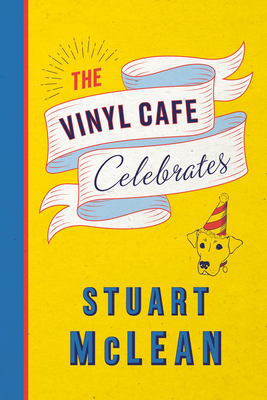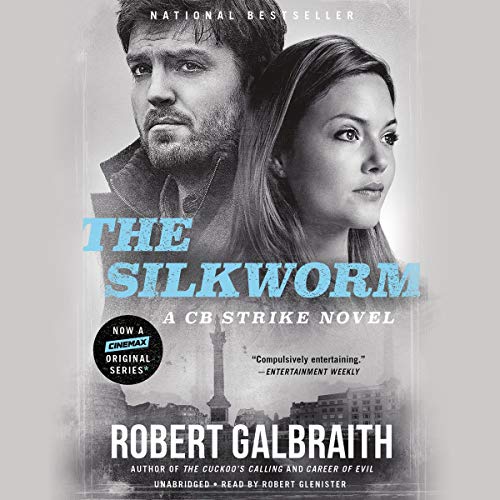When you hear a story read aloud, you can enjoy the emphasis and drama in the voice of the storyteller. Their expression of the people and events become yours, too. When you read a story, on the other hand, your imagination brings images to mind and so your own perceptions inform your understanding.
That distinction became clearer to me recently as I enjoyed two books in succession. One was The Vinyl Café Celebrates by Stuart McLean, and it is the written word of some stories I had originally heard on the radio. The second was the audiobook version of the crime novel The Silkworm by Robert Galbraith. (Robert Galbraith is a pen-name of J.K. Rowling)

I thoroughly enjoyed reading McLean’s stories. They are warm, tender, and amusing tales of everyday life in a small Canadian town. The imaginary family at the centre of these stories include Dave, who runs a record store, his wife Morley, and their children, Sam and Stephanie. Dave is a good-hearted man with only the best of intentions but, one way and another, he ends up in lots of unexpected and hilarious situations. A canoe trip that was meant to be a romantic anniversary becomes an exercise in survival. One Christmas he belatedly discovers that “taking care of the turkey” meant defrosting it, too. Solving that little problem results in so much inventiveness that you can only cheer at the outcome.
As much as I enjoyed this book, I have to say I missed the sound of Stuart McLean’s voice. I have fond memories of listening to him tell these stories on CBC radio. I would often tune in to listen to the weekly broadcasts, and his gentle voice always sounded as though he was smiling. The program aired from 1994 to 2015, and when I was reading the book, I tried to imagine his voice, his tone, and his perfect pauses.
Right after I had read The Vinyl Café Celebrates, I listened to the audio book The Silkworm, a great whodunnit. This is the second in the C.B. Strike series of mysteries, and it revolves around the death of an unpopular author, Owen Quine.

The reader is thrust quite quickly into the dog-eat-dog world of literature publishing, and I suspect that the author may have had an axe to grind. Even so, it is a fascinating yarn with lots of red herrings and possible villains. The version I listened to was narrated brilliantly by Robert Glenister. He gave the characters each their own “voice,” including various accents which, to my ear, were pretty nearly perfect. I heard pronunciations I recognized from London, Cornwall, and Yorkshire, as well as the standard, non-regional, BBC accent of the narrator.
One difficulty I found in listening to the story was that I wanted to know how some words were spelled. In particular, the name of the deceased author, Quine, sounded strange to my ear and I didn’t know how to write it for this essay until I had looked it up online. (I would have spelled it with a ‘y’, based only on how I heard it.) Some other names and places were new to me and, similarly, I wondered how they were written.
It also dawned on me that when I am reading the text of a conversation, I never think that a character in a novel is speaking too quickly for me to understand them easily. They always speak at the speed of my comprehension. The same is not true for an audiobook. Sometimes I want to slow someone down, but I don’t have that control. I can only rewind and replay, which takes away some of the spontaneity. Nevertheless, The Silkworm is an engaging story with believably flawed characters who navigate city living and expenses in ways most of us can relate to while, at the same time, solving a crime.
Both of these books are recommended, and both have given me reason to reconsider the significance of ‘voice’ in all its meanings.
Interesting comments regarding reading and listening. I’ve watched a couple of CB Strike shows, and they were good.
This was my first experience with CB Strike. I don’t think I like him very much but that’s ok. I don’t think I am supposed to. It’s a great mystery novel.
I am going to take a risk and read, instead of listen to, The Vinyl Cafe Celebrates. I had to go with interlibrary loan (for a free version anyway) and they did not have the audiobook available. I do like hearing a book read well, out loud, and that would be so cool to hear stories you had heard on the radio. I am hoping the stories stand up in print as well. When you talked of the Vinyl Cafe, the Corner Gas Station TV series came to mind. My husband and I thoroughly enjoyed those and recommend them to friends. Being a Harry Potter fan, I read the first two books, as I enjoy reading series. But, when I started the third book, I decided that this series, while written well, was way darker than I wanted to put into my brain, so quit. An audio book that was well-read, is “The Lost: A Search for Six of Six Million” by Daniel Mendelsohn. My husband and I listened to it on our 3,000 round trip last October. It’s twenty hours of listening, and we finished it one hour before we returned home. We still talk about it. It’s read by Bronson Pinchot, who’s a master at all of the different New York and European accents. And timely to read now as it involves a trip to Ukraine.
I hope you enjoy The Vinyl Cafe. It is delightful in its almost-corny down-home warmth.
My reaction to the Harry Potter books was similar to yours. Clearly, we are not the target audience! 🙂 The teenager in my life loved them all.
Thank you for the recommendation of The Lost. I will add it to my To Read list. It sounds like something I will enjoy.
Oh, “almost-corny down-home warmth” sounds perfect for me! To correct what I last wrote, I did love the Harry Potter series, even though some of them had some dark spots. It’s the Cormoran Strike series I quit reading.
Oh, I see! I enjoyed the mystery of the CB Strike book, but I didn’t like any of the characters in it! I don’t know if I will read any more of the series, mostly for that reason.
It’s a good indication of what you’ll think of the rest of the series.
If you’re listening from your phone, I believe there is a speed control. There for awhile mine was set at 1.5 times the speed and I was delighted to find I could slow the narrators down. Sometimes when I’m listening to a book while driving, I find my mind wandering and so I still need to rewind, but that’s happen with regular books when I’ve had to go back and re-read several pages.
I did not know that! Thank you, Sally. I will do that in future.